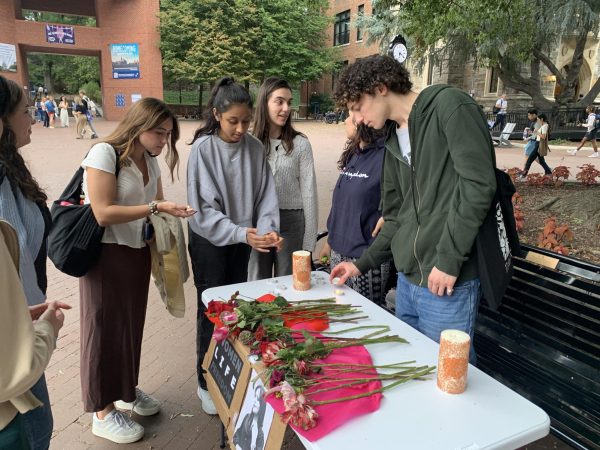Georgetown University community members gathered at a commemorative vigil to mark the second anniversary of Mahsa Amini’s death.
Amini, a 22-year-old Iranian woman, died Sept. 16, 2022, while in the custody of Iran’s “morality police,” a force responsible for enforcing Iran’s strict dress code regulations, after she was arrested for allegedly improperly wearing a hijab. The Sept. 16 vigil was organized by Georgetown’s Iranian Cultural Society (ICS) in Red Square. ICS members lit candles and set up a memorial for members of the Georgetown community to stop by and pay their respects.
After the “morality police” arrested Amini, she was sent to a detention center in Tehran, where police officers reportedly beat her unconscious; she died three days later. In the immediate aftermath of her death, protestors demonstrated across Iran, sparking a global movement for the human rights of Iranian women known as the Woman, Life, Freedom movement; Georgetown students also joined a protest in downtown Washington, D.C.
Ava Joulapour (SOH ’25), the president of ICS, said the second anniversary of Amini’s death is an opportunity to show members of the Georgetown community that the Women, Life, Freedom movement continues to remember Amini’s life and her legacy across the globe.
Full disclosure: Ava Joulapour previously contributed to The Hoya.
“We’re doing a vigil and remembrance of her and to remind Women, Life, Freedom is still alive,” Joulapour said. “People are still fighting at home and we honor and respect every day what they’re doing for us.”
Satya Heidrich-Amin (SFS ’25), the outreach coordinator for ICS, said it is important to commemorate Amini’s life amidst the tumult of global politics.
Full disclosure: Satya Heidrich-Amin (SFS ’25) served as a News Desk Editor in Fall 2023 and News Staff Writer in Fall 2021, Spring 2021, Fall 2022 and Spring 2023.
“Marking the two-year anniversary is important to remember that major issues shouldn’t be forgotten within the news cycle and just because other important things happened doesn’t detract from the things that happened before,” Heidrich-Amin told The Hoya. “With the news cycle it’s easy for something to happen, everyone pays attention to it for the next month, if that, and then people forget about it.”
Heidrich-Amin said Amini’s death impacted her family and catalyzed a significant shift in Iran’s national discourse.

“I remember when everything happened, it had a huge impact on my family and the Iranian community as a whole,” Heidrich-Amin said. “It definitely marked a shift in Iran. Before, there was the sentiment that everything was getting slightly more liberal and slowly progressing. This was really a wake-up call for a lot of people that wasn’t the case and that without drastic change nothing will ever change.”
Melanne Verveer, the executive director of the Georgetown Institute for Women, Peace and Security and former U.S. Ambassador-at-Large for Global Women’s Issues, said students’ efforts should not go overlooked as tools like social media can connect students to Iranian women.
“Many tens of thousands of women in Iran are connected on social media and these are the kinds of things that really enable them to understand that the battle isn’t just theirs and that there are others who care about them,” Verveer told The Hoya.
Julien Fagel (SFS ’25), an attendee at the vigil, said he came to pay his respects and support members of the Iranian community, many of whom also identify as Persian, in their ongoing struggle for democracy and freedom.
“I’m here today to pay my respects, I have a lot of Persian friends back home in L.A., and I have a lot of Persian friends here, and I’ve seen how what’s going on in Iran affects them,” Fagel told The Hoya. “It’s important to me to show up and support them and the causes they believe in: freedom and democracy for the people of Iran.”
Verveer said there are abundant opportunities in D.C. to pursue activism and stay educated on important human rights issues.
“There are any number of ways because the campus is in Georgetown, in Washington, D.C. — so many opportunities to bring people together who are experts,” Verveer said. “That’s something we strive to do, which is provide the students with opportunities to relate to these people who are experts but many have endured their own experiences in Iran and can speak volumes about what is happening there.”
Verveer said though the vigil and speaking out on a college campus may seem small amidst the global Woman, Life, Freedom movement, activism events taken all together can have a major impact.
“The aggregate of these kinds of activities does make a difference, it does influence others and it will affect you and how you lead your lives into the future,” Verveer said. “I think we should never underestimate what a vigil does, what speaking out can do.”